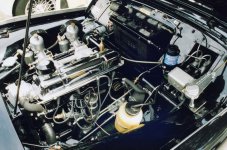RJS
Jedi Warrior
Offline
Hey,
Gotta a TR4A with at motor rebuilt 10 years and 7K miles ago. Started suffering crankcase pressurization and oil leaks this past year. The leaks are pretty bad, most seals and a 3-6" puddle under the rear main seal after a 45 minute cruise. Here are the vitals:
Dry compression: 180/180/180/180 psi
Wet compression: 208/200/200/200 psi
Spark Plugs: look perfect, light tan powdery look
Intake Vacuum: a nice 20" Hg at idle
PCV: completely serviced, even replaced with new from Moss
Oil: Castrol GTX 10W-40
Other than the oil leaks, the motor starts, idles and cruises perfectly. Returns ~22mpg. If I remove the PCV and run a breather on the crankcase, it barely leaks a drop. (I know, I know, I know...I could leave it there but, I am dying to figure this out).
Any ideas what's going on? I have narrowed it down to a few theories.
1. given the compression numbers above, is the blow-by excessive? If so, would moving up to 20W-50 oil fix this?
2. alternatively, does it appear this motor is running a higher than stock compression ratio which is OK but creates extra blow-by volume which the stock PCV cannot process?
3. If all the engine gaskets are shot, could it be pulling in too much outside air, overwhelming the PCV which then shuts down (to avoid a massive intake vacuum leak) thus, pressurizing the crankcase?
Whew! To many variables and dynamics at work here!
Would appreciate any and all thoughts on this one.
Cheers
Bob
Gotta a TR4A with at motor rebuilt 10 years and 7K miles ago. Started suffering crankcase pressurization and oil leaks this past year. The leaks are pretty bad, most seals and a 3-6" puddle under the rear main seal after a 45 minute cruise. Here are the vitals:
Dry compression: 180/180/180/180 psi
Wet compression: 208/200/200/200 psi
Spark Plugs: look perfect, light tan powdery look
Intake Vacuum: a nice 20" Hg at idle
PCV: completely serviced, even replaced with new from Moss
Oil: Castrol GTX 10W-40
Other than the oil leaks, the motor starts, idles and cruises perfectly. Returns ~22mpg. If I remove the PCV and run a breather on the crankcase, it barely leaks a drop. (I know, I know, I know...I could leave it there but, I am dying to figure this out).
Any ideas what's going on? I have narrowed it down to a few theories.
1. given the compression numbers above, is the blow-by excessive? If so, would moving up to 20W-50 oil fix this?
2. alternatively, does it appear this motor is running a higher than stock compression ratio which is OK but creates extra blow-by volume which the stock PCV cannot process?
3. If all the engine gaskets are shot, could it be pulling in too much outside air, overwhelming the PCV which then shuts down (to avoid a massive intake vacuum leak) thus, pressurizing the crankcase?
Whew! To many variables and dynamics at work here!
Would appreciate any and all thoughts on this one.
Cheers
Bob

 Hey there Guest!
Hey there Guest!
 smilie in place of the real @
smilie in place of the real @
 Pretty Please - add it to our Events forum(s) and add to the calendar! >>
Pretty Please - add it to our Events forum(s) and add to the calendar! >> 

 A friendly reminder - be careful what links you click on here. If a link is posted by someone you don't know, or the URL looks fishy, DON'T CLICK. Spammers sometimes post links that lead to sites that can infect your computer, so be mindful what you click.
A friendly reminder - be careful what links you click on here. If a link is posted by someone you don't know, or the URL looks fishy, DON'T CLICK. Spammers sometimes post links that lead to sites that can infect your computer, so be mindful what you click.